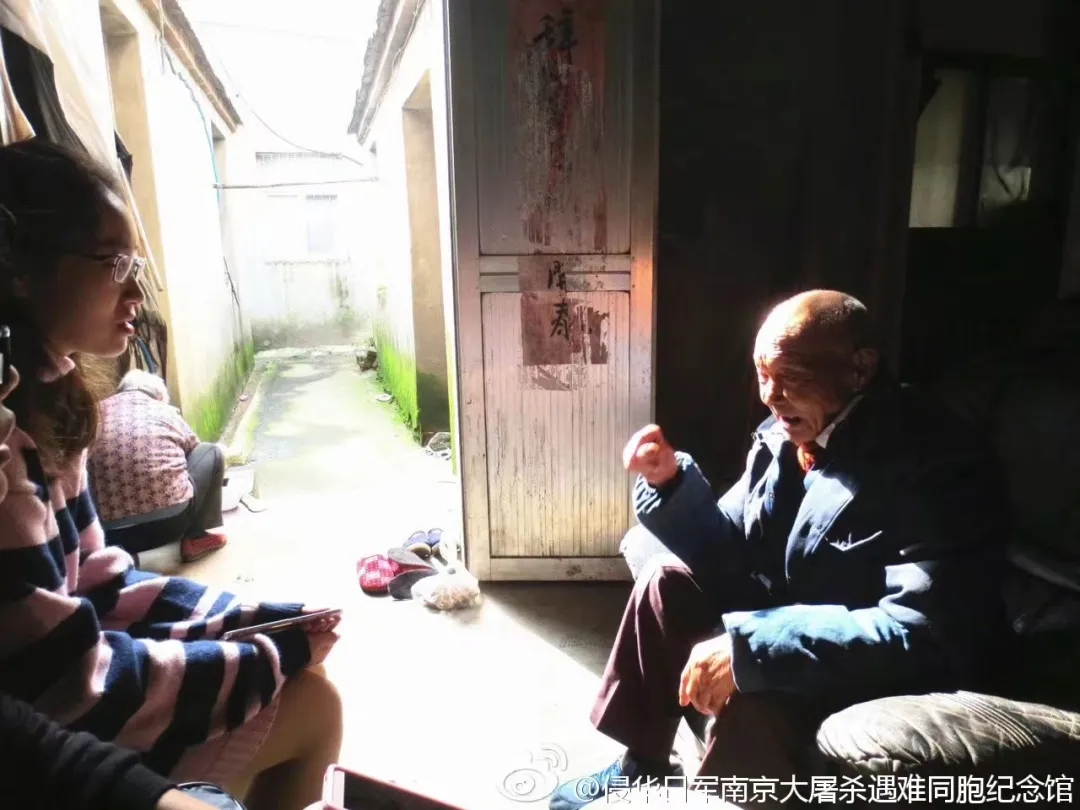Nanjing Massacre Survivor Zhou Zhilin Passed Away
We are deeplysaddened to hear of the passing of Zhou Zhilin, a survivor of the Nanjing Massacre, on the evening of July 20 at the age of 99.
Zhou experienced the horrors of the massacre firsthand. Below is the testimony provided by Zhou regarding his experiences during the massacre:
My name is Zhou Zhilin, born on December 23, 1925. In 1937, I lived in Luojiabian, Qilin Township, Jiangning District, Nanjing.
One day in 1937, my uncle, my father’s younger brother Zhou Lixin (who was in his 40s), another villager whose name I no longer remember, and I were on our way to the farm across the road. As we prepared to cross, a truck full of Japanese soldiers approached. We were so scared that we immediately ran away, yet they already spotted us and chased after us. Their vehicle was very fast. My uncle run into a pond, while I hid nearby, about ten meters away. The other villager disappeared. Five Japanese soldiers got out of the truck, one of them stabbed my uncle, causing him to scream in pain. They stabbed him again, killing him. I lay on the ground a few meters away, pretending to be dead, too frightened to move. Fortunately, the soldiers were called back by their comrades,and I sat there, paralyzed by fear, crying. The truck later drove to a temple in the Paitou area, where they set the building on fire, creating enormous plumes of smoke. The Japanese soldiers had left a trail of murder behind them.
Our village was also targetedby Japanese soldiers during their aggression. For a time, I stayed home to look after the house while my father took the rest of my family to a refugee camp at Qixia Temple in Nanjing. One day, the Japanese soldiers advanced upon the eastern edge of our village. Unaware of their approach, I was on my way to the pond to fetch water when the alarming news reached me. I was so terrified that I hidin the pond until around 4 pm. On another occasion, while out to get water again,I encountered a squad of Japanese soldiers. Along with seven or eight other villagers, I was captured and foreced to kneel.They intended to kill us.A translator employed by the soldiers pleaded for our lives, but his pleas went unheard. Just as they were about to carry out their murderous intent, a fat pig appeared out of nowhere, diverting their attention. Seizing the moment, the translator urged us to flee. Many believe we owe our survival to that pig, as more lives would have been lost otherwise. Unfortunately, not everyone was as fortunate. I heard that Yang Kuncai’s father and another villager named Tang Shanlin were killed. The Japanese soldiers destroyed most of the houses in our village, butours was spared. They also searched for girls and women, committing acts of sexual violence.
Later, I fled to Qixia Temple as well, but it proved to be less safe than expected, with Japanese soldiers frequently causing disturbances and searching for women. Our family then sought refuge at the Jiangnan Cement Plant, which was operated and protected by Westerners, deterring the Japanese soldiers from entering. I saw those Westerners in the refugee camp. By March or April of the following year, we left the camp and returned home, though the situation remained unstable.

A photograph depicting the moment when a volunteer from the School of History at Nanjing University conducted an interview with Zhou Zhilin to gather oral testimonies in 2016
Zhou had survived three near-death experiences during the Nanjing Massacre, a story he shared only with close family and neighbors. It wasn’t until 2015 that his experiences were officially recognized and documented through the collection of oral testimonies.That year, a village official happened to hear his story and helped him gain national recognitionas a survivor of the Nanjing Massacre. Reflecting on his past, Zhou, shortly before his passing, simply sighed, “I was so lucky that I escaped death three times!”
Despite his traumatic past, Zhoulived a happy life in his later years,surrounded by family.He remained active well into his 90s, still able to do farm work, till the soil and plant vegetables. When he carried two buckets of water, his steps were steady and firm.His greatest wish was for a prosperous homeland, and he hoped that the youngergeneration would never forget the innocent lives lost during those tragic times, striving instead to excel in their studies and work hard for a better future.

